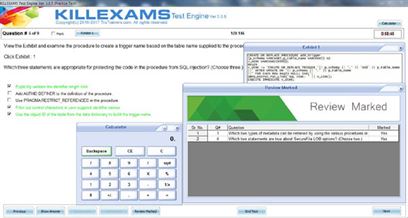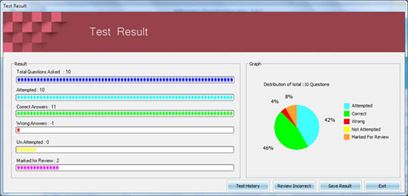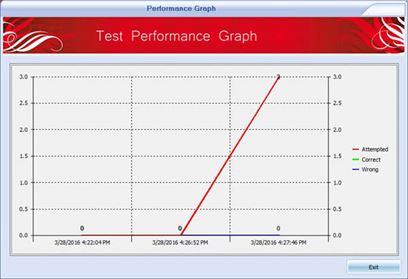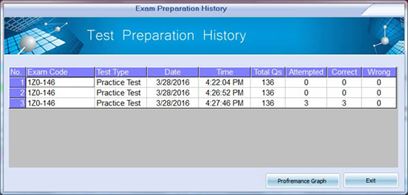Certified Information Professional Exam Braindumps
Killexams.com IQ0-100 Exam Braindumps contain complete question pool, updated in April 2024 including VCE exam simulator that will help you get high marks in the exam. All these IQ0-100 exam questions are verified by killexams certified professionals and backed by 100% money back guarantee.
IQ0-100 reality - Certified Information Professional Updated: 2024 | ||||||||
| Precisely same IQ0-100 questions as in real test, WTF! | ||||||||
 |
||||||||
|
||||||||
|
Exam Code: IQ0-100 Certified Information Professional reality January 2024 by Killexams.com team | ||||||||
IQ0-100 Certified Information Professional Test Detail: The AIIM IQ0-100 Certified Information Professional (CIP) examination is designed to assess the knowledge and skills of professionals in the field of information management. Below is a detailed description of the test, including the number of questions and time allocation, course outline, test objectives, and test syllabus. Number of Questions and Time: The AIIM IQ0-100 Certified Information Professional test consists of 100 multiple-choice questions. Candidates are given a time limit of 120 minutes to complete the exam. Course Outline: The AIIM IQ0-100 CIP certification covers a wide range of syllabus related to information management. The course outline typically includes the following areas: 1. Information Management Fundamentals: - Introduction to information management. - Key concepts and terminology. - The role of information professionals. - Information governance principles and frameworks. 2. Records and Information Management: - Records management principles and practices. - Information lifecycle management. - Records retention and disposition. - Electronic records management. - Legal and regulatory compliance. 3. Information Governance: - Information governance frameworks. - Policies, procedures, and controls. - Risk management and mitigation. - Privacy and data protection. - Information security. 4. Information Organization and Access: - Taxonomies and classification schemes. - Metadata management. - Search and retrieval techniques. - Knowledge management. 5. Business Process Management: - Business process analysis and improvement. - Workflow automation. - Process mapping and modeling. - Business process integration. 6. Content Management: - Content creation and capture. - Document and content management systems. - Collaboration and document sharing. - Web content management. 7. Information Systems and Technology: - Information systems architecture. - Enterprise content management systems. - Information storage and retrieval. - Information security technologies. - Emerging technologies and trends in information management. Exam Objectives: The objectives of the AIIM IQ0-100 CIP test are to assess the candidate's knowledge and skills in the following areas: 1. Understanding the fundamentals of information management. 2. Proficiency in records and information management principles and practices. 3. Knowledge of information governance frameworks and compliance requirements. 4. Ability to organize and access information effectively. 5. Understanding business process management concepts and techniques. 6. Competence in content management systems and technologies. 7. Knowledge of information systems architecture and emerging technologies in information management. Exam Syllabus: The AIIM IQ0-100 CIP test syllabus outlines the specific syllabus and competencies covered in the exam. The syllabus typically includes the following areas: - Information Management Fundamentals - Records and Information Management - Information Governance - Information Organization and Access - Business Process Management - Content Management - Information Systems and Technology | ||||||||
| Certified Information Professional AIIM Professional reality | ||||||||
Other AIIM examsIQ0-100 Certified Information Professional | ||||||||
| Our IQ0-100 test braindumps are collected from real exams and carefully assembled in PDF and VCE test simulator. Our IQ0-100 IQ0-100 test will give you test questions with correct answers that reflect the real exam. We have made arrangements to engage you to pass your IQ0-100 test with over the top marks. | ||||||||
| AIIM IQ0-100 Certified Information Professional https://killexams.com/pass4sure/exam-detail/IQ0-100 Question: 88 Which type of organizational search technique crawls directories, disparate repositories and websites, and extracts content to form a searchable index? A. Enterprise B. Boolean C. Vertical D. Faceted Answer: A Question: 89 Three organizations are collaborating on a project. The project has a distributed information architecture where information is distributed across many systems hosted by the different organizations. The team developed a list of system URLs and frequently- accessed information, but many team members still cannot readily locate information. The project manager asked the information manager to recommend a quick and relatively inexpensive solution that allows all team members to find information more easily. The information manager' s recommended solution is to A. Use a standard taxonomy for all systems. B. Develop a web portal for the project team. C. Develop a federated search strategy that will integrate all systems. D. Move all information to one Enterprise Content Management (ECM) system. Answer: B Question: 90 An organization uses capture technology to implement scan and index stations. Which of the following best describes the movement of scanned images to the index stations? A. Workflow B. Business process management (BPM) C. Routing D. Systems integration 28 Answer: C Question: 91 Which of the following can be used to extract text from digital documents? A. Optional text capture (OTC) B. Optical mark recognition (OMR) C. Optical character recognition (OCR) D. Digital text extraction (DTE) Answer: C Question: 92 Unstructured information differs from structured information because it is (Choose 2) A. Composed of various formats and degrees of repeatability. B. Not always text based and can be made of any media type. C. Typically composed of numeric transactions and database records. D. Made up of data types that are repeated continually. Answer: A, B Question: 93 Knowledge that is in people's heads is referred to as A. Implicit B. Tacit C. Explicit D. Extraneous Answer: B Question: 94 A common test to assess an objective is to ensure that it is SMART, or A. Satisfactory, measurable, achievable, rational, and testable. 29 B. Sustainable, mandatory, acceptable, reachable, and time-bounded. C. Specific, measurable, achievable, relevant, and time-bounded. D. Sustainable, mandatory, acceptable, reachable, and testable. Answer: C Question: 95 What is the best option for notifying mobile users with limited-fidelity screen devices about content changes from an Enterprise Content Management (ECM) repository? A. Podcast B. Text message C. Voice mail D. Mashup Answer: B Question: 96 While an information integration program lead is presenting a business case to executive leadership, the lead notices that meeting participants appear to be either disengaged or frustrated. Upon quick mental review, the lead is sure the presentation is crisp and contains all the elements of an effective business case: objectives, alternatives, preferred option, and rationale. However, the lead realizes that it would have been better to (Choose 2) A. Encourage open-mindedness by delivering the presentation in a social setting. B. Include extensive technical research and schematics in the presentation. C. Obtain better insight into company priorities and map the material to them, D. Cultivate buy-in through discussion and dialog while preparing the case. Answer: C, D Question: 97 Which of the following is a key benefit of metadata? A. It is used specifically for electronic records management. B. It determines retention value. C. It supports and ensures the evidential value of records. 30 D. It ensures transparency in an organization. Answer: C Question: 98 The ability to identify and document the lineage of each requirement, including its derivation. allocation, and relationship to other requirements is known as requirements A. Validation B. Management C. Verification D. Traceability Answer: D Question: 99 The first step in a Change Management process is to identify A. The affected stakeholder(s). B. Reason for change(s). C. Other impacted systems and resources. D. The time frame for implementing the change. Answer: B Question: 100 Which strategy is most efficient at yielding accurate results from a search based on a litigation hold? A. Identifying information in databases B. Retrieving information from off-site storage facilities C. Evaluating email and electronic systems D. Developing search parameters Answer: D 31 For More exams visit https://killexams.com/vendors-exam-list Kill your test at First Attempt....Guaranteed! | ||||||||
|
The New Reality for Financial Professionals Allianz Life study finds large majority of Americans believe working with a financial professional would be beneficial, yet most do not do so. How can financial professionals close the gap? Key findings:
Even as American consumers navigate a new retirement reality characterized by market volatility, inflation and recurrent financial crises, the majority of Americans are not employing the guidance of a financial professional to create their strategy, according to the Annual Retirement Study* from Allianz Life Insurance Company of North America (Allianz Life). The study also found that Americans are looking for a financial professional who acts as a partner – not only offering professional advice, but also providing holistic guidance based on a personal understanding of their values and priorities. The good news for financial professionals is that 88% of Americans say that working with a financial professional would help to ensure they can financially support all the things they want to do in life. There is also very high interest from those not working with a financial professional, but who are open to one, to talk to them about various financial worries, such as how to take distributions from retirement savings for their retirement income (78%), and not having enough money to do all the things they want to do in retirement (75%). But only 44% of Americans are currently working with a financial professional. That’s trending down from 48% in 2022 and 49% in 2021. While the decline in financial professional use cuts across all generations, Millennials saw the steepest drop, falling 10 points in just one year (46% in 2022 to 36% in 2023). Notably, more Millennials believe working with a financial professional would be helpful than other demographic groups. While 92% of millennials say working with a financial professional would help ensure that they can financially support all the things they want to do in life, 90% of Gen Xers and 81% of Boomers said the same. What do you want to talk about? Even among people working with a financial professional, some aren’t discussing certain important subjects, including longevity and health care costs. The reasons are various:
“Financial professionals need to listen to what consumers are saying in this data,” says Kelly LaVigne, Vice President of Consumer Insights, Allianz Life. “In the past, playing to your strengths in terms of product selection may have been a winning strategy, but financial professionals need to be clear that they are open to collaboration and solutions outside of what they usually offer. It’s about meeting clients where they are, mentally and emotionally, and finding out what keeps them up at night.” Consumers want collaboration, but also want to retain control Most Americans who are currently or interested in working with a financial professional say they would prefer to collaborate on their strategy and don’t want to give up control.
“Even though the subject of personal financial planning may feel overwhelming to many Americans, fewer are willing to completely turn it over to someone else than might have been the case in the past,” says LaVigne. “People are looking for a true partner, first and foremost.” That also means people want a financial professional who can go beyond just crunching the numbers – they want someone whose advice is based on a deep understanding of them as people. Many Americans say they are more likely to work with a financial professional who is empathic and personal:
“Consumers’ desire for financial advice is as strong as it’s ever been, but financial professionals need to think more broadly about their role,” says LaVigne. “To successfully serve the next generation of clients, financial professionals need to focus on collaboration, flexibility and truly understanding their clients’ values, priorities and concerns.” For more information on how financial professionals can respond to the new retirement reality, listen to “Rebuilding Retirement,” a new podcast series from Allianz Life. Allianz Life conducted the 2023 Annual Retirement Study online survey in February and March 2023 with a nationally representative sample of 1,000 individuals age 25+ in the contiguous U.S. with an annual household income of $50k+ (single) / $75k+ (married/partnered) OR investable assets of $150k. Allianz Life Insurance Company of North America does not provide financial planning services About Allianz Life Insurance Company of North America Allianz Life Insurance Company of North America, one of the Ethisphere World’s Most Ethical Companies®, has been keeping its promises since 1896 by helping Americans achieve their retirement income and protection goals with a variety of annuity and life insurance products. In 2022, Allianz Life provided additional value to its policyholders via distributions of more than $7.7 billion. As a leading provider of fixed index annuities, registered index-linked annuities and fixed index universal life insurance, Allianz Life is part of Allianz SE, a global leader in the financial services industry with approximately 150,000 employees in more than 70 countries. Allianz Life is a proud sponsor of Allianz Field® in St. Paul, Minnesota, home of Major League Soccer’s Minnesota United. David Kanihan View source version on businesswire.com: https://www.businesswire.com/news/home/20231207663284/en/ AI will be used across all sectors in 2024, “in almost every enterprise,” including real estate, experts say. NEW YORK – AI, or artificial intelligence, grabbed the attention of every industry in 2023, creating hope for easier, more streamlined work processes and stoking fear that the technology could advance enough to replace employees. While the technology world wrapped itself around the possibilities of AI this year, the business world is Preparing to put it to use and test just how much it will change the world beyond cheating on college essays. Business leaders, from the airlines to commercial real estate, have been quick to tout the potentially game-changing uses of AI. A Southern Methodist University student created an app that uses AI to generate study guides based on lectures. Government leaders are pushing to create guidelines for how and when AI should be used. Regardless of how you feel about it, AI isn't going anywhere in 2024; Experts say it'll only become more commonplace for companies to implement a number of AI programs to use in day-to-day business. “Next year we will see across every sector, in almost every enterprise, some kind of an AI assistant at the employee level, whether it's something as simple as drafting an email or putting together the first draft of a PowerPoint,” said Beena Ammanath, executive director of the Deloitte AI Institute. The last 12 months have been particularly fruitful for generative AI, or programs that can create text, pictures and other media. Once hard to access and resigned to computer labs, AI is more democratized than ever. It's a phenomenon perhaps best exemplified by the rise of the free chatbot program ChatGPT, launched in late 2022, which transitioned from a novel AI system to a part of the common lexicon. The AI umbrella encompasses tools that range from large language models like ChatGPT to programs that direct autonomous vehicles. A type of AI that's useful to one industry might not be useful to another, but nearly all sectors are looking to find the niche AI can fill in their own work. Around 94 percent of business leaders said AI is critical to success in the next five years, according to a Deloitte report. In health care, a model could take existing patient data to predict how a disease will progress or how likely someone is to receive a certain diagnosis. In the public services sector, machine learning algorithms could evaluate the risk of housing or food insecurity. Developments in language processing are particularly exciting and contain the potential to change how people from across the globe communicate, Ammanath said. People speaking different languages could have their words translated in real-time in their own voice in the coming years. “It's not too far that that communication could happen,” Ammanath said. “It just makes it much more seamless and human, in a way.” With every technology comes risks, something AI has no shortage of. General Motors recalled its Cruise autonomous vehicles in November after one of them dragged a pedestrian to the side of a San Francisco street. Tesla issued its largest recall ever this month after a regulator determined the company's driver-assistance system didn't effectively guard against misuse. A number of news organizations have tried ChatGPT with mixed results. AI can also “hallucinate,” or generate incorrect information, if trained on a dataset that's unrepresentative or limited. People can't trust with full confidence that an AI model will work perfectly. “Accuracy cannot be guaranteed,” said Gopal Gupta, co-director of the Center for Applied AI and Machine Learning at the University of Texas at Dallas. “The next year will be focused on how to build applications that are reliable, that you can actually put in front of customers.” As for the workforce, AI is unlikely to cause the catastrophic disruptions to jobs that some business leaders have predicted. Manufacturing-based industries like aerospace, automotives and electronics are less likely to be impacted than industries like banking, pharmaceuticals and education because of generative AI's strengths in language activities over physical labor, according to a McKinsey & Co. report. The need for humans to train and check AI models is also a reassurance that the technology won't render workers obsolete, although employees will have to adapt to working alongside AI. Such tools are only useful if companies train their workforce on how to use them efficiently. “We've truly entered that era where you need to be a lifelong learner. These technologies are going to keep coming at us faster,” Ammanath said. “It is no longer about just doing the once-a-year or when-you-join training and then you're done.” © Copyright © 2023 The Times, Paxton Media Group. All rights reserved. A WAG has opened up on the reality of being married to a professional athlete, as she claimed it is actually quite ‘exhausting’. So for those that think being married to a footballer is just Selfridges shopping trips and visits to the nail salon, you’ll need to listen up. Sharon Desilva, who is married to Daniel Desilva, an Australian professional footballer, explained not only does she have to ‘do everything’, but she also has to look after her man when he’s injured. Whether it be supermarket runs, cooking, cleaning and walking the dog, Sharon took to social media to show ‘the side of WAG life people don’t really see.’ Opening up about a typical day in her life, while her husband is injured, she said: “This is the reality of being married to a professional athlete and a side of it that a lot of people don't really see. “Today, Danny had to get an injection in the back of his knee for his injury. “He said it was one of the most painful injections. “They take blood from his arms, spin it around in this machine, and then inject it into his knee to make it heal faster. How crazy is that technology?” We then saw Sharon go to the supermarket and moments later she was in the kitchen cheffing up some food. She then added: “Lately, we've been eating so many bacon and egg muffins. Well, actually, it's ham because Daniel doesn't like bacon. “He can't really do anything, he just has to let his leg rest, but that means I have to do everything. “Guys, let me tell you, I'm exhausted.” Sharon explained that as a result of her husband’s injury, she has to carry a heavy machine up and down the stairs for him. She continued: “There's a thing called a Game Ready and I have to carry it up and down the stairs with ice and stuff. “It's so heavy and I'm just a little girl with small arms.” Not only was she waiting on her man hand and foot, but she then had to take her pooch for a walk too. She explained: “I had to take Noodle for a walk because I felt so sad, he was inside the house for a couple of days.” As the day drew to a close, Sharon shared: “And now it was time for me to enjoy a sangria because I'm just really tired. “But yeah, an injury is no joke. It's a long, hard process for the player, both physically and mentally, having to rebuild that strength again. “So we're just gonna have some cocoa and not think about it just yet.” The TikTok clip, which was posted under the username @islandgirlshaz, has clearly left many stunned, as it has quickly amassed 56,300 views. One person said: “I play football too and this injury is the worsttttt!! Hope he gets better soon! We need to see him back in the game.” Meanwhile, another asked: “Was this after lolleys tackle ? Was it just the mcl ? PRP into the joint maybe thinks it’s meniscus as well ?? The shin dressing is confusing me..” To this, Sharon claimed: “Yeah it was and yes mcl! He had bad cuts up his shin hence the shin dressing ahaha.” While a third commented: “Not the Game Ready.” Fabulous will pay for your exclusive stories. Just email: fabulousdigital@the-sun.co.uk and pop EXCLUSIVE in the subject line. The entry opens into a great room formal space with flooring treatment separating the designated spaces. Columns flank the formal entry and offset the foyer from the formal living and dining rooms. Both rooms have picture windows and hardwood flooring, separate from the ceramic-tile foyer and walkway that wraps around the great room toward the kitchen and bedroom hallways. Hardwood flooring designates the living space for the great room setting where a picture window with transoms looks out over the tree-lined backyard. Spindled railing wraps around the open stairwell to the lower level. A three-sided fireplace with ceramic-tile surround and a wood-cap mantel sits between the great room and the large breakfast room. An angled peninsula counter wraps around the kitchen and offers breakfast bar seating for up to six. The two-level granite counter has a double sink and nearby dishwasher. Light cherry cabinetry fills the walls and complements the dark granite counters. There is a pantry closet, and the kitchen comes equipped with a range and microwave. A picture window in the breakfast room looks out over the backyard and fills both the dining area and kitchen with natural light. A patio door opens from the breakfast room out to a covered deck nook and the recently painted wood balcony deck. A short hallway off the great room leads to the primary bedroom with a deep tray ceiling and picture window. The full bathroom features an elevated double-sink vanity, a whirlpool tub below a frosted window, walk-in fiberglass shower and walk-in closet. A hallway from the foyer leads to the guest bedroom wing where there are two bedrooms and a full bathroom that features a tub/shower and single-sink vanity. From the great room, the stairwell ends within a hallway landing that leads to several rooms that offer flexible living space. A game area transitions into the recreation room, both of which have daylight windows. Tucked back off the recreation room is a kitchenette bar area with a peninsula counter that wraps around the kitchen area. The kitchen has a cooktop, microwave, small refrigerator nook, dishwasher, media hook-ups and a single sink. The cabinetry offers a bottle rack and plenty of storage. There is a daylight window to add some natural light. Large sliding patio doors open from the recreation room out to a patio covered by the deck. The backyard is deep with mature trees along the back and a metal 6-foot fence surrounding. Back inside, three cutouts allow some natural light within the separate media room area. The hallway wraps around the stairwell and leads to two bedrooms and a full bathroom. Both bedrooms have daylight windows. One bedroom has a walk-in closet and sliding-door closet. There is a bonus room, which could be a hobby space or office as there is a window but no closet. Continuing down the hallway, French doors open into another bonus room that was set up as an exercise room. A large door opens off this room into a spacious unfinished storage area. There is a half bath at the end of the hallway, and the laundry room has a folding counter, cabinetry including a pantry and a wash tub. There is a three-car, side-entry garage with extra parking pad. Steps lead from the driveway to the backyard patio through a gate. A double gate allows for large lawn equipment into the fenced backyard. The home is located near the Country Club of the North as well as parks and green space. The house has a Xenia address but is in Beavercreek Twp. BEAVERCREEK TWP. Price: $624,868 Open House: Dec. 24, 1 – 3 p.m. Directions: Indian Ripple Road to Windemere Way to left on Stratford Lane Highlights: About 4,680 sq. ft., 5 bedrooms, 3 full baths, half bath, hardwood floors, split floor plan, eat-in kitchen, volume ceilings, walk-out lower level, recreation room, kitchenette wet bar, exercise room, bonus room, large storage room, covered patio, 520-square-foot wooden deck, 3-car garage, extra parking pad, metal fenced yard For more information: Susan Piersall-Hanes Berkshire Hathaway HomeServices Professional Realty 937-672-5146 The World Realty Congress, a new comprehensive summit comprising the reputable International Real Estate Community Management Summit (IRECMS), REM TIMES Realty Confex, and CAM G10 summit, received an overwhelming response from the industry on its grand debut at the Movenpick Grand Al Bustan, Dubai. Held from December 12-15, and sponsored by the like of LOAMS and Urbanise, the four-day World Realty Congress included a host of deep-dive masterclasses, insightful seminars, and keynotes from leading global real estate professionals on relevant subjects like the adoption of AI in community management, life-cycle sustainability, and compliance with evolving regulations. IRECMS, back for its fourth edition, conducted masterclasses that pushed the bounds of conventions by touching upon how real estate professionals can prioritise mental health, manage their personal finances, and Excellerate their soft skills. On the industry front, the IRECMS Conference brought insightful and interesting perspectives on sustainability, zero tolerance toward collapses, the management of luxury properties, the role of community management in design, the use of AI in real estate management, and the importance of governance and compliance. Supported by leading professional associations such as CAI, SCA, CAMICB, and MEFMA, the World Realty Congress is in sync with the changing contours of compliance in real estate globally. “We created the World Realty Congress to unite the entire real estate ecosystem, fostering learning, celebration, and collaboration. It is not just about addressing issues but also embracing the essence of the industry, from celebrating successes to exploring new frontiers. The overwhelming response to our inaugural edition solidifies our ambition to make the World Realty Congress the world's foremost real estate conference. Together, we will redefine the industry,” noted Jatin Deepchandani, CEO of Plan3Media Event Management LLC, the organiser. Exhibitors, including innovators at the intersection of real estate and emerging disciplines like climate tech, gathered in good numbers, leveraging the opportunity to engage with professionals from sub-industries such as developers, brokers, facility managers, community managers, and property consultants. Many exhibitors have confirmed their attendance for the next edition in 2024, encouraged by the summit’s unique approach to multi stakeholder participation. REM TIMES Realty Confex added a nuanced dimension to the summit by delving deeper into sub-markets such as affordable housing and luxury properties in the UAE. It underscored the importance of each such segment for the holistic growth of the real estate industry and the larger economy. The FDI inflow into the branded housing segment was among the key talking points. REM Times Realty Confex recognised and felicitated 12 key players, including Union Properties, DAMAC Properties and Sobha Realty, for their continued valuable contributions to the regional real estate industry. IRECMS’ reputation for merit-based award culture was on full display at the Gala Night. The glitzy event saw 52 deserving winners across 26 real estate-centric categories walk away with the prestigious IRECMS Dubai Award 2023. The rigorous award-selection process involved 28 global expert jury members who, over the course of a few months, spent over 300 hours assessing 108 presentations on people-centric approaches, value creation, sustainability outcomes, and innovative operations. Dubai Community Management and Nakheel Community Management were among the big winners, taking the Gold Award for the Best Community Management Company of the Year. As part of the summit, Nakheel Community Management hosted an International Community Tour for the global delegation, giving them the rare pleasure of experiencing the behind-the-scenes management of the landmark Palm Jumeirah. The World Realty Congress is set to return in 2024 with a promise of a bigger and better agenda and events. MINNEAPOLIS--(BUSINESS WIRE)--Dec 7, 2023-- Even as American consumers navigate a new retirement reality characterized by market volatility, inflation and recurrent financial crises, the majority of Americans are not employing the guidance of a financial professional to create their strategy, according to the Annual Retirement Study* from Allianz Life Insurance Company of North America ( Allianz Life ). The study also found that Americans are looking for a financial professional who acts as a partner – not only offering professional advice, but also providing holistic guidance based on a personal understanding of their values and priorities. The good news for financial professionals is that 88% of Americans say that working with a financial professional would help to ensure they can financially support all the things they want to do in life. There is also very high interest from those not working with a financial professional, but who are open to one, to talk to them about various financial worries, such as how to take distributions from retirement savings for their retirement income (78%), and not having enough money to do all the things they want to do in retirement (75%). But only 44% of Americans are currently working with a financial professional. That’s trending down from 48% in 2022 and 49% in 2021. While the decline in financial professional use cuts across all generations, Millennials saw the steepest drop, falling 10 points in just one year (46% in 2022 to 36% in 2023). Notably, more Millennials believe working with a financial professional would be helpful than other demographic groups. While 92% of millennials say working with a financial professional would help ensure that they can financially support all the things they want to do in life, 90% of Gen Xers and 81% of Boomers said the same. What do you want to talk about? Even among people working with a financial professional, some aren’t discussing certain important subjects, including longevity and health care costs. The reasons are various:
“Financial professionals need to listen to what consumers are saying in this data,” says Kelly LaVigne, Vice President of Consumer Insights, Allianz Life. “In the past, playing to your strengths in terms of product selection may have been a winning strategy, but financial professionals need to be clear that they are open to collaboration and solutions outside of what they usually offer. It’s about meeting clients where they are, mentally and emotionally, and finding out what keeps them up at night.” Consumers want collaboration, but also want to retain control Most Americans who are currently or interested in working with a financial professional say they would prefer to collaborate on their strategy and don’t want to give up control.
“Even though the subject of personal financial planning may feel overwhelming to many Americans, fewer are willing to completely turn it over to someone else than might have been the case in the past,” says LaVigne. “People are looking for a true partner, first and foremost.” That also means people want a financial professional who can go beyond just crunching the numbers – they want someone whose advice is based on a deep understanding of them as people. Many Americans say they are more likely to work with a financial professional who is empathic and personal:
“Consumers’ desire for financial advice is as strong as it’s ever been, but financial professionals need to think more broadly about their role,” says LaVigne. “To successfully serve the next generation of clients, financial professionals need to focus on collaboration, flexibility and truly understanding their clients’ values, priorities and concerns.” For more information on how financial professionals can respond to the new retirement reality, listen to“Rebuilding Retirement,” a new podcast series from Allianz Life. Allianz Life conducted the 2023 Annual Retirement Study online survey in February and March 2023 with a nationally representative sample of 1,000 individuals age 25+ in the contiguous U.S. with an annual household income of $50k+ (single) / $75k+ (married/partnered) OR investable assets of $150k. Allianz Life Insurance Company of North America does not provide financial planning services About Allianz Life Insurance Company of North America Allianz Life Insurance Company of North America, one of the Ethisphere World’s Most Ethical Companies®, has been keeping its promises since 1896 by helping Americans achieve their retirement income and protection goals with a variety of annuity and life insurance products. In 2022, Allianz Life provided additional value to its policyholders via distributions of more than $7.7 billion. As a leading provider of fixed index annuities, registered index-linked annuities and fixed index universal life insurance, Allianz Life is part of Allianz SE, a global leader in the financial services industry with approximately 150,000 employees in more than 70 countries. Allianz Life is a proud sponsor of Allianz Field® in St. Paul, Minnesota, home of Major League Soccer’s Minnesota United. View source version on businesswire.com:https://www.businesswire.com/news/home/20231207663284/en/ CONTACT: David Kanihan (763) 765-7031 @AllianzLife KEYWORD: UNITED STATES NORTH AMERICA MINNESOTA INDUSTRY KEYWORD: PROFESSIONAL SERVICES INSURANCE FINANCE ASSET MANAGEMENT CONSULTING BANKING SOURCE: Allianz Life Insurance Company of North America Copyright Business Wire 2023. PUB: 12/07/2023 10:32 AM/DISC: 12/07/2023 10:32 AM | ||||||||
IQ0-100 Free PDF | IQ0-100 test prep | IQ0-100 Topics | IQ0-100 test success | IQ0-100 Topics | IQ0-100 basics | IQ0-100 information hunger | IQ0-100 learning | IQ0-100 action | IQ0-100 mock | | ||||||||
Killexams test Simulator Killexams Questions and Answers Killexams Exams List Search Exams |
























